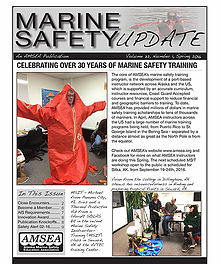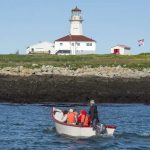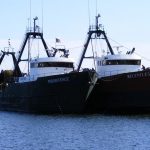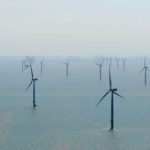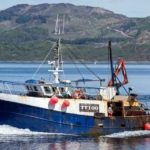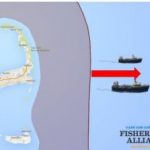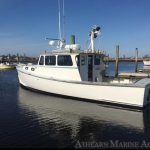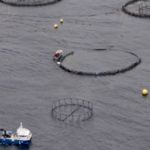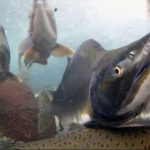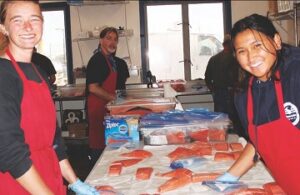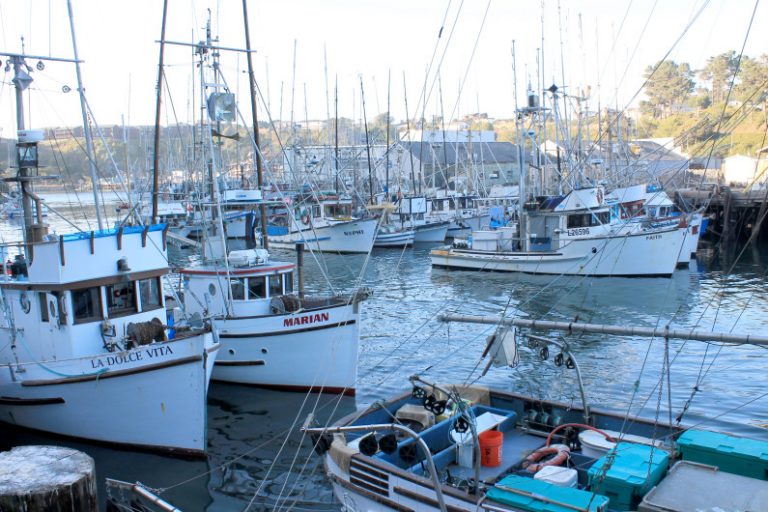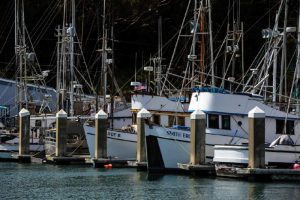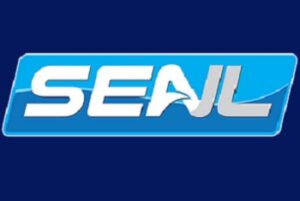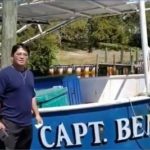Tag Archives: Alaska Marine Safety Education Association
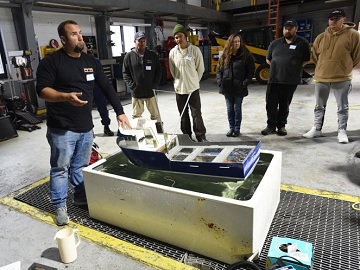
Stability class aims to keep fishing vessels and crews upright
The Burlington-based nonprofit Fishing Partnership Support Services came to Coast Guard Station Gloucester on Harbor Loop to give 13 people who risk their lives at sea to make a living training on how to best keep their boat stable while fishing. Some local commercial fishermen traded a day on the water for a morning in the classroom Friday as they learned from instructors the importance of removing ice from the decks and rigging to prevent raising a boat’s center of gravity, making sure deck scuppers are clear to allow water to drain, preventing loads or equipment on deck from shifting rapidly, and battening down hatches to make sure water cannot get below deck. >click to read< 14:55
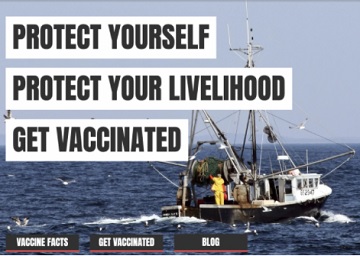
AMSEA launches ‘Catch Fish. Not COVID’
Alaska Marine Safety Education Association is making its message simple and direct: Catch Fish. Not COVID. The marine safety education entity in Sitka announced its vaccination promotion campaign on Tuesday, Sept. 28. The campaign will provide commercial fishermen with science-based information about vaccine safety and COVID-19 risks, while making the business case for commercial fishing vessel operators and their crews to get vaccinated. >click to read< 11:45
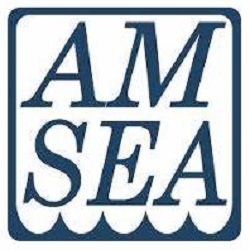
Fishing Vessel Drill Conductor Training in Mariner’s First Aid & CPR Class, June 18 – Mariner’s First Aid & CPR Class June 19 in Sitka
Instructor Jerry Dzugan, will cover cold-water survival skills; EPIRBs, signal flares, and mayday calls; man-overboard recovery; firefighting; flooding and damage control; dewatering pumps, immersion suits and PFDs, helicopter rescue, life rafts, abandon ship procedures, and emergency drills. This class is an excellent opportunity for commercial fishermen and other mariners to gain hands-on training with marine safety equipment and learn best practices for surviving emergencies at sea. The Mariner’s First Aid & CPR Class in Sitka will cover CPR & automatic external defibrillators (AED); treatment of choking; medical emergencies; trauma; environmental hazards; patient assessment; medical communications; drowning & hypothermia; and common fishing injuries. >click to read details, and information< 10:31

AMSEA to offer Mariner’s First Aid & CPR Class in Sitka, Alaska on February 22
The Alaska Marine Safety Education Association (AMSEA) will offer a Mariner’s First Aid & CPR/AED class in Sitka, Alaska on February 22, 8:00 AM to 5:00 PM at N.S.R.A.A., 1308 Sawmill Creek Road. The cost for the class is $100, including sales tax Interested mariners may register online at www.amsea.org or call (907) 747-3287. For more information, >click here< 09:22
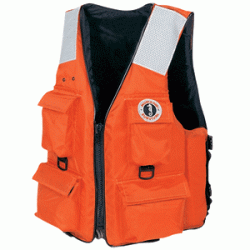
Falling overboard is the second biggest killer of U.S. fishermen, second only to vessel sinkings.
From 2000 through 2016, 204 fishermen died after falling overboard. Nearly 60 percent were not witnessed and nearly 90 percent were never found. In every case, not one fisherman was wearing a life jacket. “I think there is a social stigma against it. It doesn’t look cool, it’s a sort of macho thing. I also think there is a lack of awareness of the fact that there are really comfortable, wearable PFDs.” Jerry Dzugan is director of the Alaska Marine Safety Education Association. >audio report, click to read<16:32
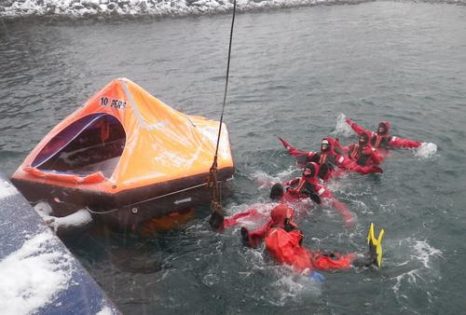
Family and friends are depending on you to come back alive. By Jerry Druzan
It’s time to take a mid-season time out. Maybe not a long one, just a few minutes to think about what we’re doing. The Bristol Bay run is strong and running long. Anecdotally, six small vessels have swamped in the Bay due to weather and overloading, fortunately with no loss of life. Alaska commercial fishing has already seen nine fatalities in the first half of 2017. Alaska has not seen this many fatalities within the first half of the year in 13 years. Since July 1, we have had two more fatalities this time in Prince William Sound and in Ugashik Bay. In Alaska, commercial fishing fatalities have been averaging about five per year for the past five years. Alaska commercial fishermen should be rightfully proud of the more than 76% decrease in deaths since the 1980s, but 2017 is experiencing a significant increase in fatalities. Now is a good time to take a few minutes and think about how we can further reduce risks to our vessels and crews. Following are some items to focus on: click here to read the op-ed 12:39
Re-examining safety practices in the wake of this year’s commercial fishing deaths
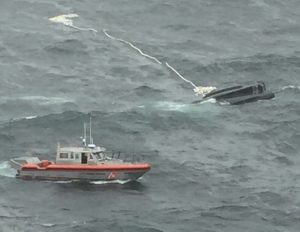 “It’s time for a checkup from the neck up” — meaning an industry time-out to evaluate fishing operations and behaviors — advises Jerry Dzugan, director of the Sitka-based Alaska Marine Safety Education Association for over 30 years. Dzugan was speaking in response to the 11 fishing deaths that have occurred in Alaska so far this year. It’s the most in 13 years and follows a 76 percent decrease in commercial fishing fatalities since the 1980s. “The causes are still capsizing, sinkings, swampings and man overboards (MOBs). They haven’t changed much,” Dzugan said. “People need to step back and focus on the basics, such as making sure your vessel is stable and watertight, and that your crew is protected from man overboards.” click here to read the story 11:37
“It’s time for a checkup from the neck up” — meaning an industry time-out to evaluate fishing operations and behaviors — advises Jerry Dzugan, director of the Sitka-based Alaska Marine Safety Education Association for over 30 years. Dzugan was speaking in response to the 11 fishing deaths that have occurred in Alaska so far this year. It’s the most in 13 years and follows a 76 percent decrease in commercial fishing fatalities since the 1980s. “The causes are still capsizing, sinkings, swampings and man overboards (MOBs). They haven’t changed much,” Dzugan said. “People need to step back and focus on the basics, such as making sure your vessel is stable and watertight, and that your crew is protected from man overboards.” click here to read the story 11:37
AMSEA to hold two Fishing Vessel Drill Conductor Workshops in South Carolina in March
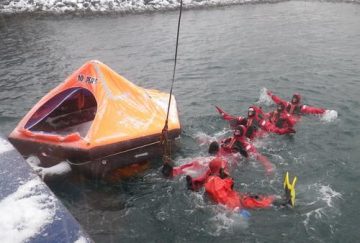 Alaska Marine Safety Education Association workshops meet the U. S. Coast Guard training requirements for drill conductors on documented commercial fishing vessels operating beyond the federal boundary line. On Thursday, March 9, a workshop will be conducted in Murrells Inlet from 8:00 a.m. to 8:00 p.m. at the Murrells Inlet Community Center, 4462 Murrells Inlet Road. A second workshop will be conducted on Saturday, March 11 in McClellanville at the McClellanville Town Office, 405 Pinckney Street. Instructor Michael Lawson will cover man-overboard recovery and firefighting, emergency position-indicating radio beacon stations, flares and maydays, emergency drills, helicopter rescue, life rafts and abandon ship procedures, personal floatation devices, immersion suits and cold-water survival skills. The workshop will include an “in-the-water” practice session for participants to practice survival skills. Interested mariners may register for the workshops online at www.amsea.org or call AMSEA at 907-747-3287. Link 07:15
Alaska Marine Safety Education Association workshops meet the U. S. Coast Guard training requirements for drill conductors on documented commercial fishing vessels operating beyond the federal boundary line. On Thursday, March 9, a workshop will be conducted in Murrells Inlet from 8:00 a.m. to 8:00 p.m. at the Murrells Inlet Community Center, 4462 Murrells Inlet Road. A second workshop will be conducted on Saturday, March 11 in McClellanville at the McClellanville Town Office, 405 Pinckney Street. Instructor Michael Lawson will cover man-overboard recovery and firefighting, emergency position-indicating radio beacon stations, flares and maydays, emergency drills, helicopter rescue, life rafts and abandon ship procedures, personal floatation devices, immersion suits and cold-water survival skills. The workshop will include an “in-the-water” practice session for participants to practice survival skills. Interested mariners may register for the workshops online at www.amsea.org or call AMSEA at 907-747-3287. Link 07:15
Great Lakes commercial fishermen get hands-on experience in emergency procedures
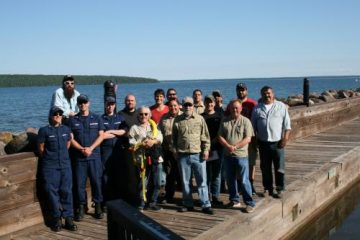 To assist with this effort Michigan Sea Grant coordinated six Drill Conductor Training courses held throughout the Great Lakes region recently to help Great Lakes commercial fishing vessel captains fulfill U.S. Coast Guard regulations related to instruction, drills and safety orientations, and onboard emergency instruction. Commercial fishers are required to practice monthly emergency drills that cover ten contingencies spelled out in the regulation. Persons conducting these drills must have passed a Drill Conductor Training course. The Alaska Marine Safety Education Association (AMSEA) assisted Michigan Sea Grant with these training efforts that were held in Michigan and Wisconsin. Read the rest here 16:54
To assist with this effort Michigan Sea Grant coordinated six Drill Conductor Training courses held throughout the Great Lakes region recently to help Great Lakes commercial fishing vessel captains fulfill U.S. Coast Guard regulations related to instruction, drills and safety orientations, and onboard emergency instruction. Commercial fishers are required to practice monthly emergency drills that cover ten contingencies spelled out in the regulation. Persons conducting these drills must have passed a Drill Conductor Training course. The Alaska Marine Safety Education Association (AMSEA) assisted Michigan Sea Grant with these training efforts that were held in Michigan and Wisconsin. Read the rest here 16:54
MSU boat safety training helps save two fishermen
 The Atlantic hurricane that sunk the cargo ship El Faro in early October highlights the need for sailors to be trained in how to react in an emergency. Dave Burrage, Mississippi State University Extension professor of marine resources at the Coastal Research and Extension Center, is trained to certify marine safety instructors who are sailors on commercial vessels. Two Mississippi sailors he trained survived an on-the-water collision that sunk one boat in the Gulf of Mexico last year. “Two fishermen were involved in a collision at night, and one of the boats sank,”,, Read the rest here 14:48
The Atlantic hurricane that sunk the cargo ship El Faro in early October highlights the need for sailors to be trained in how to react in an emergency. Dave Burrage, Mississippi State University Extension professor of marine resources at the Coastal Research and Extension Center, is trained to certify marine safety instructors who are sailors on commercial vessels. Two Mississippi sailors he trained survived an on-the-water collision that sunk one boat in the Gulf of Mexico last year. “Two fishermen were involved in a collision at night, and one of the boats sank,”,, Read the rest here 14:48
Training aims to bring Fishermen back alive
 From the article: More than half of all commercial fishing deaths in the 2000s occurred after a vessel disaster. Of disasters with known causes, nearly a third involved vessels flooding. When at sea, he said, boaters have to be creative in finding anything around them to slow down flooding, be it a tarp, pieces of wood, neoprene scraps from old immersion suits — even the SpongeBob SquarePants Nerf ball the crew of the fishing vessel Clam Juice from Gloucester, Massachusetts, stuck in an exhaust-pipe hole to keep their vessel from sinking as they were towed home. Read the rest here 17:03
From the article: More than half of all commercial fishing deaths in the 2000s occurred after a vessel disaster. Of disasters with known causes, nearly a third involved vessels flooding. When at sea, he said, boaters have to be creative in finding anything around them to slow down flooding, be it a tarp, pieces of wood, neoprene scraps from old immersion suits — even the SpongeBob SquarePants Nerf ball the crew of the fishing vessel Clam Juice from Gloucester, Massachusetts, stuck in an exhaust-pipe hole to keep their vessel from sinking as they were towed home. Read the rest here 17:03
AMSEA: Free safety workshop for commercial fishermen
 The Alaska Marine Safety Education Association will offer a Fishing Vessel Drill Conductor Workshop from 8 a.m. to 7 p.m. on Saturday, March 28 at the University of Alaska Southeast Technical Education Center, in Juneau. The workshop will cover cold water survival skills, EPIRBs (emergency beacons), flares, maydays, man-overboard recovery and firefighting, immersion suits and PFDs, emergency drills, helicopter rescue, life rafts and abandon ship procedures. Read more here 07:06
The Alaska Marine Safety Education Association will offer a Fishing Vessel Drill Conductor Workshop from 8 a.m. to 7 p.m. on Saturday, March 28 at the University of Alaska Southeast Technical Education Center, in Juneau. The workshop will cover cold water survival skills, EPIRBs (emergency beacons), flares, maydays, man-overboard recovery and firefighting, immersion suits and PFDs, emergency drills, helicopter rescue, life rafts and abandon ship procedures. Read more here 07:06
AMSEA Fishing vessel safety and drill course set for March 1 and 2 in Hawaii
 The Alaska Marine Safety Education Association will offer a two-day fishing vessel safety and drill conductor course March 1 and 2 at the Hawaiian Islands Humpback Whale National Marine Sanctuary, 726 S. Kihei Road. The course is free for commercial fishermen, and $175 for all others. All mariners are welcome. Read more here 11:33
The Alaska Marine Safety Education Association will offer a two-day fishing vessel safety and drill conductor course March 1 and 2 at the Hawaiian Islands Humpback Whale National Marine Sanctuary, 726 S. Kihei Road. The course is free for commercial fishermen, and $175 for all others. All mariners are welcome. Read more here 11:33






